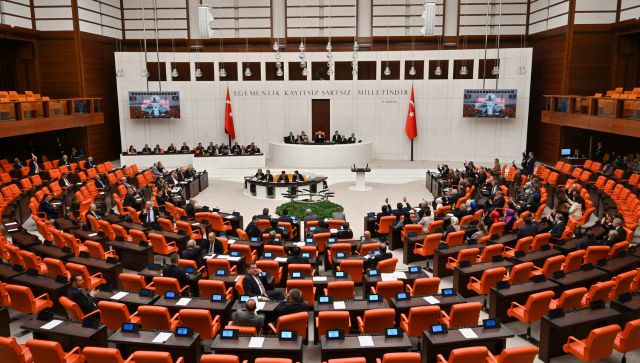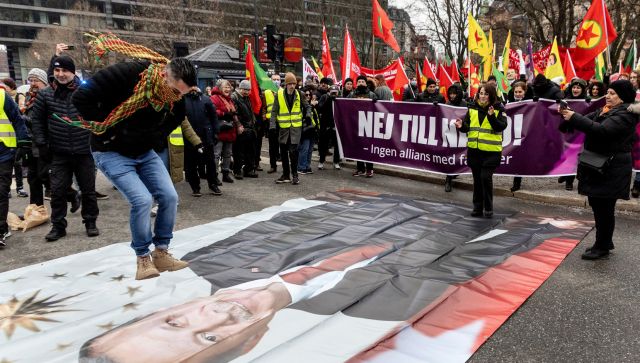
Turkish president Recep Tayyip Erdogan has opposed Sweden’s NATO bid citing security concerns. Reuters File Photo

Turkish president Recep Tayyip Erdogan has opposed Sweden’s NATO bid citing security concerns. Reuters File Photo
After months of delay, Turkey has finally green-lit Finland’s application to join North Atlantic Treaty Organization (NATO).
Turkey’s parliament on Thursday (30 March) voted unanimously in favour of Helsinki’s bid, paving the way for the Nordic country’s accession to the Western military alliance.
This comes after Hungary’s parliament ratified Finland’s application earlier this week.
However, Turkey and Hungary have continued to block Finland’s neighbour, Sweden, from joining the transatlantic military alliance.
The Nordic nations had dropped their decades-long policy of military non-alignment and applied for NATO membership last year following Russia’s invasion of Ukraine.
Why has Turkey approved Finland’s NATO application but not of its neighbour Sweden? Let’s take a closer look.
Turkey approves Finland’s NATO bid
Turkish president Recep Tayyip Erdogan has fulfilled his “promise” to allow Finland to be a part of the defence alliance, as per CNN.
Earlier this month, Finnish officials visited Turkey to discuss the country’s NATO application.
Addressing a joint press conference with Finnish president Sauli Niinisto, Erdogan said at the time that Helsinki has taken “sincere and concrete steps” to meet the security commitments it made to Ankara.
“We decided to start the approval process of Finland’s NATO accession protocol in our Parliament, based on the sensitivity and distance achieved by our country in addressing our security concerns,” Erdogan was quoted as saying by The Washington Post.
Further, the Turkish leader said that talks with Sweden would “continue on the basis of the principles of our alliance and our approach to the fight against terrorism.”

Last summer at a NATO summit in Madrid, Turkey, Sweden and Finland signed a memorandum laying out measures the countries would take to address Ankara’s arms exports and terrorism, reported Politico.
Sweden and Finland also lifted their arms embargo on Turkey, which was imposed after Ankara invaded Syria in 2019.
Turkey’s security concerns
Though 28 out of NATO’s 30 members were quick to assent to Sweden and Finland’s bid to join the military alliance, Turkey and Hungary continued to hold out for their own reasons.
However, it was Turkey that was seen as the main roadblock to these Nordic countries’ NATO membership.
Turkey believes Sweden acts as a haven for groups it considers to be terrorist organisations and security threats such as the banned Kurdistan Workers Party (PKK) and Fetullah Terrorist Organization (FETO), noted Associated Press (AP).
Ankara wants Stockholm to take a tougher line against militant Kurdish groups and others linked to a 2016 coup attempt in Turkey.
Sweden has rejected Turkey’s allegations of habouring Kurdish militants or supporting the PKK.
Abdullah Öcalan, a Marxist revolutionary, had formed the Kurdistan Workers’ Party – Partiya Karkerên Kurdistanê (PKK) in Kurdish – in 1978 to establish an independent Kurdistan. As per the Indian Express report, PKK members took up arms against the Turkish Army from 1984 until their leader Öcalan’s was captured in 1999.
PKK and the Turkish state have fought each other since then.
Turkey has demanded Sweden hand over around 120 suspects it deems to be threats.
“If you absolutely want to join NATO, you will return these terrorists to us,” Erdogan had said earlier this year.
“You will send these terrorists to us so that you can join NATO.”
To placate Turkey, Sweden introduced a counter-terrorism bill that was to be passed in Parliament this month. However, the anti-terror legislation has now been postponed to May.
The bill aims to target financing, aiding and propagation of terrorist groups, Anadolu Agency reported citing Swedish media.
Tensions after Quran burning
In January, the ties between the two countries soured more after an effigy of Erdogan was suspended from a lamppost in Stockholm during a pro-Kurdish demonstration.
Tensions peaked on 21 January after a leader of a Danish far-right political party burned the Quran (a holy book for Muslims) during a protest outside Turkey’s embassy in Stockholm.
Reacting sharply to the incident, Turkey condemned the act as “anti-Islam”. Turkish foreign ministry said that allowing the protest “under the guise of freedom of expression is completely unacceptable.”
Sweden also condemned the burning and the protests.

Following the incident, Ankara suspended NATO accession talks with both Nordic countries for some time.
Erdogan has used this incident to harden his opposition against Sweden’s NATO bid, as per Vox.
Domestic political reasons
Analysts believe Erdogan’s government would not approve Sweden’s NATO bid till the parliamentary and presidential elections in Turkey in May.
“Sweden faces more significant obstacles in its bid,” Hamish Kinnear, Middle East and North Africa analyst at the risk intelligence company Verisk Maplecroft, told AP in an email.
“Turkey is unlikely to approve its acceptance into the alliance before the election in May. The Quran burning incident sparked popular rage in Turkey and President Tayyip Recep Erdogan won’t want to risk angering his conservative base ahead of the polls,” Kinnear added.
Erdogan, who is facing a tough reelection, is likely to resist Sweden’s bid citing security concerns – an argument Vox says “resonates” with the vast population in Turkey.
“It’s just an issue that he would like to keep alive because that plays well, along with other elements of the foreign policy arena, which, I think, he is weaponising,” Sinan Ciddi, a professor of National Security Studies at Marine Corps University, told Vox.
“It gets the crowds fired up and gives people an extra reason to vote for him.”
Meanwhile, other NATO allies will continue to get Turkey on board for Sweden’s bid before the next summit of its leaders to be held in July in Vilnius.
With inputs from agencies
Read all the Latest News, Trending News, Cricket News, Bollywood News, India News and Entertainment News here. Follow us on Facebook, Twitter and Instagram.